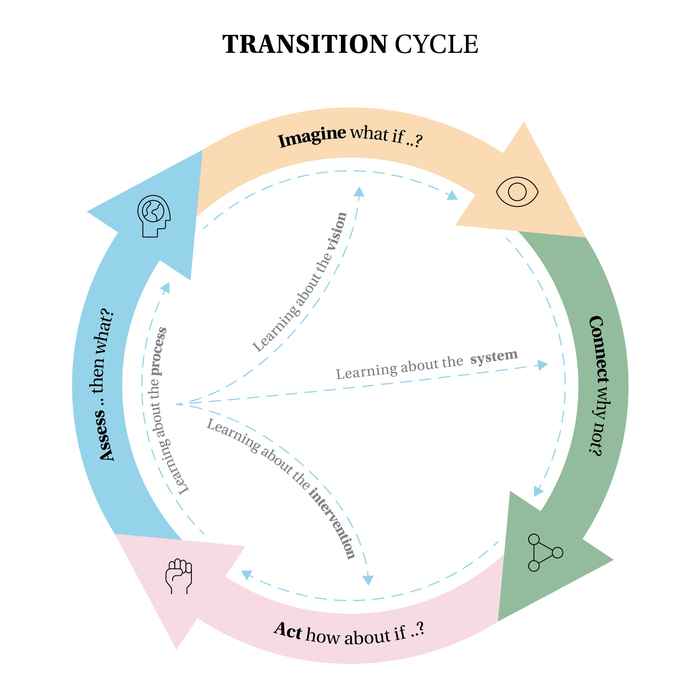Change Making: Healthy Future
Society is facing complex challenges that require a fundamental shift in thinking and doing. There are all sorts of urgent societal health-related issues that require cross-disciplinary collaboration, like keeping high-quality care available when you need it and how to support a healthy lifestyle. Today's world requires changemakers!
To facilitate transitions towards a healthy future, (collective) action is necessary to disrupt established patterns and power structures. There is a strong need for changemakers who, in collaboration with other societal partners, can initiate, create, and evaluate responsible, relevant, and innovative transitions.
The interdisciplinary course "Change Making: Co-creating a Healthy Future" has a mission to enable bachelor students from all faculties of the UvA, together with societal partners to develop the knowledge, skills, and attitudes necessary to be meaningful changemakers. Students and societal partners collaborate intensively as co-learners on healthy future issues. By bringing together experts with different backgrounds and areas of expertise, co-learning can contribute to a deeper understanding of issues and the identification of new approaches for interventions. The transition cycle serves as the guiding method in unravelling and transforming complex health-related problems.
At the end of this course, changemakers will have carried out concrete projects that have a positive impact on societal transitions in the field of health and health care as well as personal growth.
Coordinator
Dr. Tjerk Jan Schuitmaker-Warnaar
Timetable
You can find the timetable on Datanose.
Entry requirements
Open to second-year and third-year UvA Bachelor's students and other interested parties, such as contract students or students from other Dutch higher education institutions. Master's students can only participate if there are still spots available.
Registration
UvA Bachelor's students can register from 1 to 8 December 2025 in the GLASS registration rounds. Master’s students can send a short motivation to keuzeonderwijs-iis@uva.nl.
‘Bijvak’ students and contract students can register from 1 December 2025 until two weeks prior to the start of the course, by completing the online registration form.
If you have any trouble while registering, please contact us at keuzeonderwijs-iis@uva.nl.
Costs
Prices can be found on the IIS website.
What is Change Making?
Change Making goes beyond traditional education and uses the Transition Cycle. It has the following unique features:
-
Co-learning: students and professionals from the field genuinely work together, doing so from various disciplinary perspectives and areas of expertise.
-
Joint vision formation: Change Makers create a shared vision for the future. They do this by employing imagination and innovative thinking and breaking through prevailing systems.
-
Interventions in the real world: Change Makers go beyond theory by jointly carrying out small-scale, real interventions.
-
Emphasis on reflection and personal growth: Change Makers learn to know their own motivations and capabilities.
Coordinator
Dr. Tjerk Jan Schuitmaker-Warnaar
Timetable
You can find the timetable on Datanose.
Entry requirements
Open to second-year and third-year UvA Bachelor's students and other interested parties, such as contract students or students from other Dutch higher education institutions. Master's students can only participate if there are still spots available.
Registration
UvA Bachelor's students can register from 1 to 8 December 2025 in the GLASS registration rounds. Master’s students can send a short motivation to keuzeonderwijs-iis@uva.nl.
‘Bijvak’ students and contract students can register from 1 December 2025 until two weeks prior to the start of the course, by completing the online registration form.
If you have any trouble while registering, please contact us at keuzeonderwijs-iis@uva.nl.
Please note: as a contract student you can choose to participate either including or excluding assessment. If you choose the latter, you only have access to the seven lectures of the course. If you also wish to attend the seminars, please choose 'including assessment'.
Costs
Prices can be found on the IIS website.
SDGs in education
The IIS strives to reflect current societal issues and challenges in our elective courses, honours modules and degree programmes and attempts to integrate the following Sustainable Development Goals (SDGs) in this course. For more information about these goals, please visit the SDGs website.
- Mode
- Open UvA Course
- Credits
- 12 ECTS,
- Language of instruction
- English
- Conditions for admission
- Open
- Starts in
- February
- Location
- Roeterseiland campus
